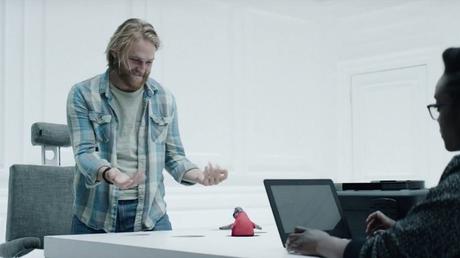
Black Mirror (2011-)Season 3, Episode 2: "Playtest"Starring: Wyatt Russell, Hannah John-Kamen, Wunmi MosakuCreated By: Charlie BookerNetwork: NetflixRating: B
Summary: A young man begins to lose sight of reality as he tests a company's new gaming console.
My Thoughts: When new gaming consoles release, major upgrades between the newer version and it's predecessor always involve the graphics. Companies usually market their console with the selling point that the graphics are so realistic that it feels as if you're in the game yourself, but how can we exist is a reality that isn't actually there? When a person plays a video game, they're taking a break from their own reality to submerge themselves in a situation that could not happen in real life. As companies upgrade their systems and continue to try emulate reality as much as they can, they're taking that break from reality away from us. They're creating a brand new one and placing us there. Have you ever felt fearful for your own life when playing a horror game? Have you ever held your own breathe as your character barely escapes some sort of peril? These sorts of reactions are no longer about us feeling for a character, we're worried about ourselves as if we were in the game. And as these systems continue to upgrade, we're only going to distance ourselves further and further away from our own man-made realities into ones that are simulated for us. And as a society, we're slowly becoming more and more accepting of all these different realities simply because we can step out of those reality and come back to our own in seconds. But what if we couldn't? What if we got stuck in the video game reality and couldn't get out? What if the video game reality actually became our own? And more importantly, if video games are becoming more realistic and we're spending more time in that reality than in our own, how will it affect the we see the world around us?
At the start of the episode we meet, Cooper, guy who picks up and leave his town to travel the world. We understand immediately that he wants to escape. His mother keeps calling him and he ignores her calls and doesn't respond. He just throws himself into enjoying whatever these new countries have to offer. Hence, he's finally gotten the escape he's wished for. However, after somehow running out cash, Cooper decides to go along and test a new gaming system for money, but it's not the kind of game Cooper was expecting. Like a documentary, Black Mirror, gives us its own representation of society. It makes the stuff of social realities visible and audible in a distinctive way; a way where we get the message loud and clear. We're supposed to believe these stories up-front and they're supposed to ring true to us even though they're presented in a fictional format. We can understand why Cooper would want to escape. Hell, life is hard, parents are overbearing and sometimes we just need time to ourselves and this is something everyone can understand. However, unlike Cooper, we can't just pick up and leave the country randomly when things get hard. Our escape lies in the small things like playing video games or watching a film or TV program. However, in this episode, what could end up being the future of video gaming comes to life. While we can simple step out of game reality into our own, Cooper can not. When he first tests the game he's hooked up to a machine that allows him to physically see and "whack" a virtual mole. He enjoys this tiny escape from his money problems, just as anyone would, but it's during the second trail of the testing that things turn sinister. He's trapped in a house among some of his greatest fears, one being a bully from high school. It's only after he realizes that these fears are real and that he could actually be harmed, that he wants out, but the thing is he can't get out. The reality he's succumb to in the video game world is now his own and the the real question of the matter is: what's real and what's not? But we really don't find that out until the very last few minutes of the episode. But the point of the episode is not for us to figure Cooper out, or even to try to piece things together. This is why we get the bare minimum on his character and those around him in the first place. This episode is about us and technology and how if we keep on trying to emulate reality, we'll lose actuality.

